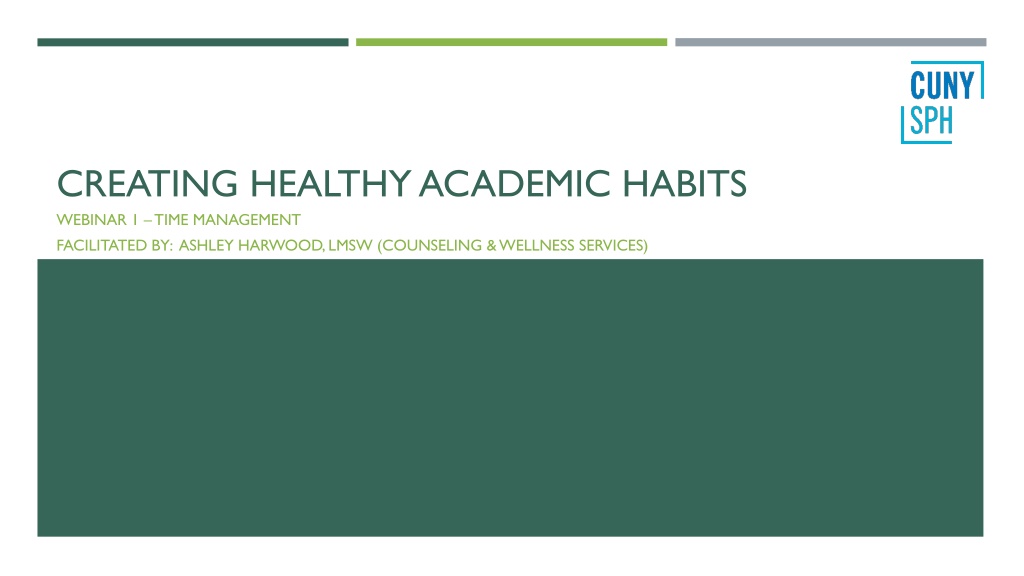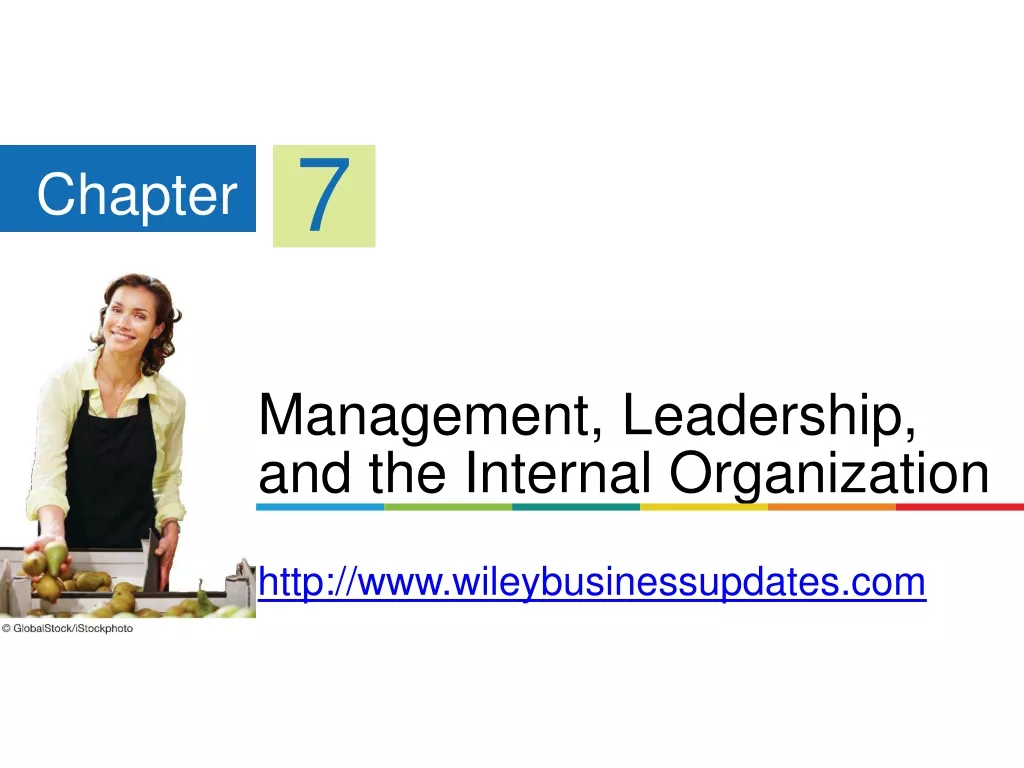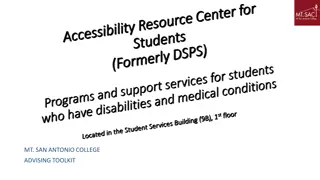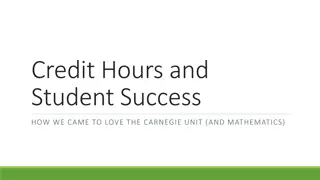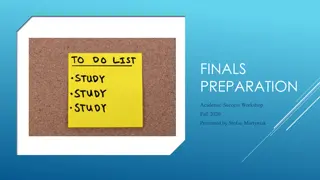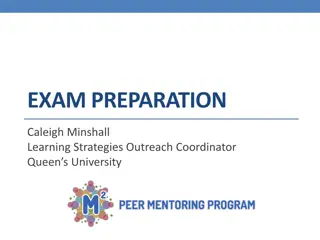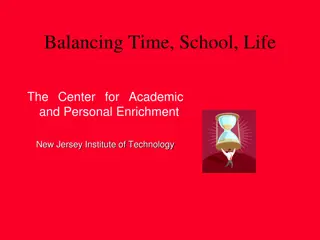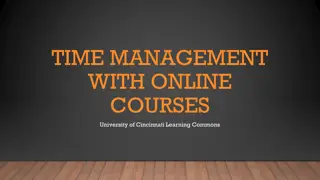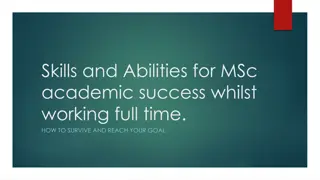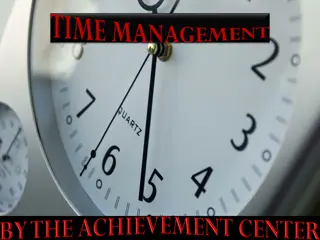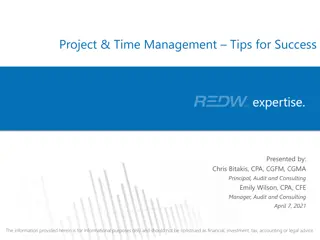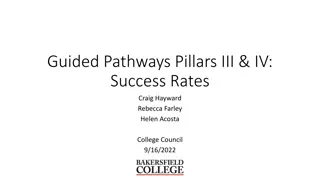Effective Time Management Strategies for Academic Success
Explore essential habits for academic success in this webinar series, focusing on time management, goal setting, self-care, mindfulness, stress reduction, combating perfectionism, and fostering positive self-talk. Learn to assess and optimize your time usage, create schedules, find ideal study locations, and minimize distractions to enhance productivity and focus.
Download Presentation

Please find below an Image/Link to download the presentation.
The content on the website is provided AS IS for your information and personal use only. It may not be sold, licensed, or shared on other websites without obtaining consent from the author.If you encounter any issues during the download, it is possible that the publisher has removed the file from their server.
You are allowed to download the files provided on this website for personal or commercial use, subject to the condition that they are used lawfully. All files are the property of their respective owners.
The content on the website is provided AS IS for your information and personal use only. It may not be sold, licensed, or shared on other websites without obtaining consent from the author.
E N D
Presentation Transcript
CREATING HEALTHY ACADEMIC HABITS WEBINAR 1 TIME MANAGEMENT FACILITATED BY: ASHLEY HARWOOD, LMSW (COUNSELING & WELLNESS SERVICES)
HABITS THAT WELL COVER IN THIS WEBINAR SERIES: Time Management (This Time!) Goal Setting Self Care Mindfulness Stress Reduction Combating Perfectionism Building Positive Self Talk
HABIT 1: TAKE AN INVENTORY OF HOW YOURE USING YOUR TIME We all have 168 hours in a week How are you using those hours? sleep, class time, studying, work, eating, exercising, traveling/commute, getting ready/grooming, chores/errands, spiritual activities, socializing, social media/texting/email, etc. College students spend on average 27 hours per week on social media, texting and video gaming. *Adapted from Illinois Graduate College Time Management 101 Workshop https://www.youtube.com/watch?v=h4uVZXuYfrk&t=404s
HABIT 2: CREATE A SCHEDULE Use a planner or digital tools to create a daily/weekly/monthly schedule, allocating specific time slots for studying, assignments, work and relaxation Prioritize academic tasks break down large projects into smaller, manageable tasks and prioritize them based on deadlines and importance Have a weekly schedule planned out (know what you need to get done each day) some find that Sundays are a good time to plan out the week ahead Plan out your day the night before
HABIT 3: FIND A GOOD PLACE TO STUDY Finding a good location to study is one of the most important elements of studying well. Look for a quiet place with minimal distractions someplace where you ll be able to focus, and won t be interrupted by loud sounds or people who constantly want your attention. A school or public library, a coffee shop, or a quiet corner of your house can all be good places to start. *Adapted from https://www.coursera.org/articles/study-habits
HABIT 4: MINIMIZE DISTRACTIONS Picking a good location to study can be the first step in keeping yourself focused on your work. But there are many types of distractions that can reach you no matter where you choose to work. Here are some tips on minimizing these distractions: Turn off your wifi: If you re working on a computer and you don t need your wifi, try turning it off. This can keep you from inadvertently wandering into the distracting parts of the internet. Be mindful of your phone: It s no secret that our smartphones can be hugely distracting. Turning off your notifications, keeping your phone out of sight in your bag, or putting it away on the charger can help you stay focused. Study with a friend/peer: Sometimes studying with a friend or two, whether or not you re working on the same material, can help keep you accountable and focused. Make sure you each are on the same page about studying and keeping one another distraction-free, at least until it s time to take a break. *Adapted from https://www.coursera.org/articles/study-habits
HABIT 5: TAKE BREAKS Taking intentional breaks has been linked to better retention, increased attention, and boosts in energy. Research shows that working for around 50 minutes, then giving yourself a 15- to 20-minute break, can lead to optimum productivity. Here are a few ways you can give yourself a break: Take a short walk Listen to a mood-boosting song Relax with a friend Stretch Meditate Zone out and daydream Have a snack Take a shower Clean your desk or room Note: Not all breaks are created equal. Checking your phone or social media as a study break has actually been linked to a decrease in performance but if you choose to do this, it s suggested to set up an alarm to keep the phone break to 15-20 minutes. *Adapted from https://www.coursera.org/articles/study-habits
HABIT 6: SPACE OUT YOUR STUDYING Cramming can still help you get a good grade on a test, but studies show that you re much more likely to forget that information as soon as the test is over. Really holding onto the material you learned (and making exam seasons less stressful) requires consistent and well-spaced out study sessions. Instead of saving your studying for before a test, briefly review material you learned once a week or even daily. If you are studying for an exam, space out your studying up to several weeks (or even months, depending on the test) leading up to the exam day. This can help you retain the information long term. The same logic applies to paper writing as well so space it out! *Adapted from https://www.coursera.org/articles/study-habits
HABIT 7: SET STUDY GOALS FOR EACH SESSION These can be time-based or content-based. For example, you might aim to study for two hours, review three chapters of your textbook, or write two pages of an assignment. Don t be too harsh on yourself if you didn t get through as much as you had planned; sometimes studying can take longer than expected. Keep taking well-spaced breaks, and schedule another study session. Avoid multitasking which can be overwhelming and actually decrease productivity -- (Instead try arranging tasks in order of importance and focus on the top 3 tasks that require the most effort during peak performance time) *Adapted from https://www.coursera.org/articles/study-habits
HABIT 8: UTILIZE CUNY SPH RESOURCES TUTORING, CAREER SERVICES & COUNSELING For writing assistance: One-on-one writing tutoring offered on Tues/Wed/Thurs (book online) Drop in office hours (over Zoom) on Wed 4-5PM (link on website) https://sph.cuny.edu/academics/academic-resources/writing-assistance/ For quantitative tutoring: Tutoring offered on Tues/Wed/Thurs (book online) https://sph.cuny.edu/academics/academic-resources/quantitative-tutoring/ Career Services: https://sph.cuny.edu/students/student-services/career-services/ Counseling & Wellness: https://sph.cuny.edu/students/student-services/student-wellness/counseling-and-wellness-services/
COVEY TIME MANAGEMENT MATRIX (EXAMPLE) *Adapted from Illinois Graduate College Time Management 101 Workshop https://www.youtube.com/watch?v=h4uVZXuYfrk&t=404s
BLANK MATRIX IMPORTANT & URGENT IMPORTANT & NOT URGENT NOT IMPORTANT & URGENT NOT IMPORTANT & NOT URGENT
LONG TERM GOAL PLANNING (EXAMPLE) *Adapted from Illinois Graduate College Time Management 101 Workshop https://www.youtube.com/watch?v=h4uVZXuYfrk&t=404s
TAKEAWAY PRACTICE POSITIVE AFFIRMATIONS I can do this It will all work out I m putting the work in, I can trust the process One step at a time I tried my best and that s enough
